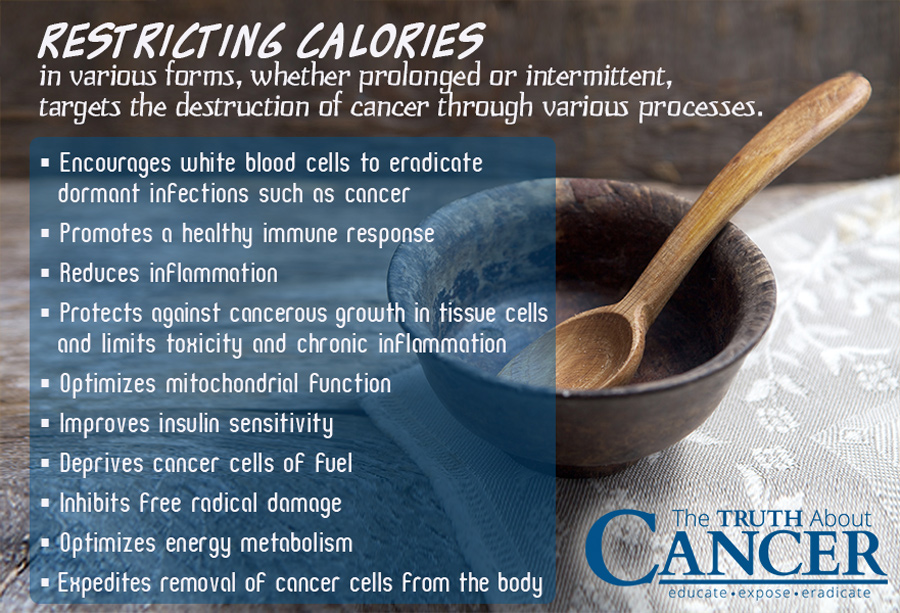Stress and the threat of food scarcity was a major component of our ancient ancestors’ lifestyles. Fast and cheap food was not located at every intersection. Convenient microwaveable meals were not an option and food hotspots such as grocery stores were nothing but an unfathomable dream. So how did people survive what many of us would easily categorize as desperate times?
Calorie restriction, also known as fasting, was a common practice. This practice has left us with an intrinsic genetic blueprint of a way of eating that ensures optimal health and wellbeing. Various forms of fasting have numerous health benefits which ultimately stave off cancer growth.
This is achieved through conserving energy, improving insulin sensitivity, managing immunity, and limiting inflammatory damage by upregulating a cellular process known as autophagy.
You may be able to look back on a time when you were sick and had a limited desire to eat. Animals naturally fast during periods of sickness while their bodies focus on resting. Our bodies possess this same mechanism to reduce stress so that our internal energy systems can focus on healing and repair of the immune system. The exception to every other species, humans are the only ones with the only abnormal habit to seek food during periods of illness. This thwarts our own body’s defense mechanisms for healing.
4 Ways Calorie Restriction Helps the Body Heal & Repair
Fasting helps to stop cancer growth and improve the body’s ability to heal and repair in 4 major ways.
-
Energy Conservation in the Body
Available energy in our body is utilized for different purposes including kinetics such as physical movement, immunity, cognitive thinking, digestion, and so on and so forth. Many people advocate eating multiple mini meals throughout the day to offer a steady supply of nutrients for metabolism and energy.
This practice of providing the body with a continual feed of food diverts energy away from these other critical life functions. Contrarily, fasting conserves energy for other bodily functions.
The process of digestion uses a lot of energy in order to divert blood and increase digestive juice production. Why is this so? Food is contaminated with harmful microorganisms whether it is raw or cooked. Digestion signals a positive response from the immune system to increase inflammatory agents to defend against the threat of invaders.
Upregulating the immune system uses an incredible amount of energy to protect against pathogens. When digestion is not occurring, the immune system is able to focus its energy on combating other problems. Fasting encourages white blood cells to eradicate dormant infections such as cancer growth.
-
Fasting Increases Immune Regulation
Fasting triggers improved regulation of the immune system. Drinking plenty of water and cleansing beverages such as apple cider vinegar and herbal tea, flushes harmful microbes and other pathogens from the gut and improves the digestive system. Consequently, this cleansing effect improves the microbial balance within the gut, thereby promoting a healthy immune response.
Fasting supports the regulation of the immune system and controls inflammatory cytokine release in the body. Two major pro-inflammatory cytokines are Interleukin-6 and Tumor Necrosis Factor Alpha. These cytokines have been shown to decrease during periods of fasting. Individuals with severe allergies may also benefit from fasting as it improves immune coordination.
-
Autophagy Protects the Body
Autophagy is a natural occurrence in the body. It involves the breakdown of damaged, old or abnormally developing cells so that their energy can be recycled for normal, healthy processes. Autophagy is a crucial part of the immune response which depends on pattern recognition receptors to detect viral cell infections.
Fasting activates the innate response of autophagy to inhibit unhealthy cellular invaders and intracellular parasites. Autophagy is essential for the removal of waste and harmful agents. It is a major step in the removal of cancer cells from the body as well. Optimizing the unique potential of autophagy to protect against cancerous growth in tissue cells and to limit toxicity and chronic inflammation is an incredible benefit of fasting.
How Fasting Improves Mitochondrial Function
Fasting allows these energy providing factories of our cells the ability to heal. When the body undergoes a period of fasting, malfunctioning mitochondria are removed from operation through autophagy ensuring the healthy mitochondria the ability to populate.
Necessary components for supplying cellular energy, such as coenzyme Q10, are better utilized in optimally functioning mitochondria. The ability for the body to repair itself limits the metabolic damage and genetic mutations that are possible with malfunctioning mitochondrial activity and inadequate respiration.
-
Fasting Improves Insulin Sensitivity
Unlike normal cells, cancer cells have up to seventy times more insulin receptors. Cancer cells primarily depend on anaerobic metabolism of sugar for energy. Intermittent fasting deprives cancer cells of required fuel, thus compromising their ability to cause free radical damage.
Fasting not only promotes the removal of improperly functioning mitochondria but also reduces the activity of major free radicals such as reactive oxygen species or ROS. Increased mitochondrial respiration is associated with the progression of tumors and increased ROS, which promotes greater cell damage and genetic mutations to cells.
Fasting also improves the body’s ability to utilize insulin more effectively which helps to maintain proper blood sugar levels and reduce inflammatory levels.
Ketogenic Diet and Fasting Offer Similar Benefits
Both strategies are therapeutic at altering metabolism to promote anti-proliferative cancer suppressing effects. As mentioned earlier, cancer cells are highly dependent on anaerobic conditions and the use of sugar for fuel.
A ketogenic diet uses the aerobic environment of the mitochondria to burn fats that have been converted to ketones in the liver. The ketones are then easy fuel for the mitochondria to create energy. This is cleaner burning fuel that is lower in destructive free radicals and other inflammatory agents.
Ketogenic diets are high in healthy fats, moderate in protein, and low in carbs. The state of ketosis has been found to be an effective therapy to change the abnormal metabolisms associated with cancer growth. The ketogenic diet is even associated with the increase in survival rates of brain cancer patients.
Both the ketogenic diet and the restriction of calories from diet promotes the internal switch from regulating glucose or sugar for fuel to increasing ketone bodies. When the body is faced with conditions of low glucose concentrations, tumors are unable to develop and grow while normal cellular functions can thrive from energy fueled from ketones.
Intermittent Fasting and Autoimmunity
Introducing intermittent fasting into your diet may help improve your symptoms associated with autoimmune complications. Individuals with rheumatoid arthritis, colitis, and Crohn’s disease as well as systemic lupus have seen an improvement in their condition through fasting. Fasting lowers the inflammatory responses associated with autoimmune disorders and helps regulate a normalized immune response.
Restricting calories in the various forms, whether prolonged or intermittent, targets the destruction of cancer through various processes. These include optimizing energy metabolism, reducing inflammation, normalizing the development of new blood vessels associated with cancer, and preventing the invasion of mutagenic agents.
How to Begin Fasting?
There are many different fasting strategies one could apply. The best way to begin fasting is by giving your body 12 hours between dinner and breakfast every single day. This allows 4 hours to complete digestion and 8 hours for the liver to complete its detoxification cycle.
Once this is a standard part of your lifestyle try taking one day a week and extending the fast to 16-18 hours. Eventually, you may choose to do a full 24 hour fast each week. Here are 5 fasting strategies you might wish to try out:
1. Simple Fast:
Basic fast with water only for 12 hours between dinner and breakfast which gives the liver a chance to complete its cycle.
Example: Finish dinner at 7:00pm and don’t eat again until 7:00am.
2. Cycle Fast:
Three times each week you fast for 16 hours by skipping either breakfast or dinner.
Example: Finish dinner at 7:00pm and eat again around 11:00am-12:00pm at lunch the next day. Do this on Monday, Wednesday, and Friday each week.
3. Strong Fast:
Consume all food in a 6-8 hour eating window each day. You would eat 2 meals per day and fast through either breakfast or dinner.
Example: This would mean fasting in the morning and eating between 12:00pm-7:00pm each day or 8:00am-3:00pm each day or whatever 6-8 hour period you like best.
4. Warrior Fast:
Ancient warriors would often march all day and would feast at night. Consume all food in a 3-5 hour eating window each day. This may be from 2:00pm-6:00pm or 3:00pm-7:00pm, etc.
5. 1-Day Food Fast:
24 hours each week with only consuming water, green powders, and herbal tea. Some may also choose to have bone broth during this fast.
Article Summary
Various forms of calorie restriction, also known as fasting, have numerous health benefits which ultimately stave off cancer growth.
Fasting helps to stop cancer growth and improve the body’s ability to heal and repair in 4 major ways:
- Energy Conservation in the Body
- Fasting Increases Immune Regulation
- Autophagy Protects the Body
- Fasting Improves Insulin Sensitivity
Fasting has many of the benefits of the ketogenic diet which target cancer growth.
Ketogenic diets are high in healthy fats, moderate in protein, and low in carbs. The state of ketosis has been found to be an effective therapy to change the abnormal metabolisms associated with cancer growth.
There are many different fasting strategies one could apply. A good way to begin fasting is by giving your body 12 hours between dinner and breakfast every single day. This allows 4 hours to complete digestion and 8 hours for the liver to complete its detoxification cycle.




















Ive found that eating healthy fats, that ive naturally fallen into a pattern of intermittent fasting without much thought put I to it. It’s amazing what being satiated does…. body is not constantly demanding input….. I end up eating two meals a day. If I know I will miss breakfast, then I make sure to have a zpoon of coconut oil. Fuels me forever!
Me too. Never thought fasting could be so effortless. “WHEAT BELLY “by Dr Davis helped me tremendously.
Might not resveratrol be useful here since it supposedly mimicks the effects of caloric restriction?
I guess for legal reasons only the wussy fasts are listed. To most americans, not eating for 24 hours is probably like a lifetime, and they’ll think they have done something extaordinary. People have fasted for days and even weeks, and their health has only improved as a result. But almost anyone can safely fast for at least three days without supervision.
I am going to do the 12 hour fast first, every time I do try to fast I get lightheaded, maybe I am not eating enough of something? I am 75 and over weight and have been trying for ages to lose some. Hopefully this will work.
Too much sugar and grains will cause the hunger and lightheadedness. Good fats will keep you full.
I’ve also read other articles indicating that fasting was really good for your health but have never done it because I’m afraid I may lose the weight I finally put on last winter. It’s been a real struggle and yes I eat lots of good fats and lots of organic and don’t eat sugary foods. I’ve never read about others in my situation so I have no idea how to go about fasting and not losing weight.
Ironic, no, that one of the natural reactions cancer patients have is to stop eating – while the medical industry thinks it has scored big if the patient eats food… counterproductive. Let them follow their own appetite… the body is very wise
I found it easier to fast when I do an enema twice a day each day I fast. This helps eliminate any toxic side effects.
I am still getting informed
This article does not cover all cancer conditions including mine. How can a person who has had an oesophagectomy and partial gastrectomy and then later a hemi thyroidectomy do this? My intake of food is so very restricted by the surgery, that I have to take prescription supplements (high calorie with minerals and vitamins) in order not to lose weight or energy else I am too weak and exhausted? (I am required to include an additional 1000 calories through supplements as I physically cannot consume enough food with my changed anatomy and digestion.) I do some juicing and cook healthy food. DB
What are some of the good fats that I can have? I try to cut my grains to 1 slice of bread a day, but I do love brown rice and barley which I put into my soups.
Read up on Paleo diet for the good oils and fats to eat and which to avoid.